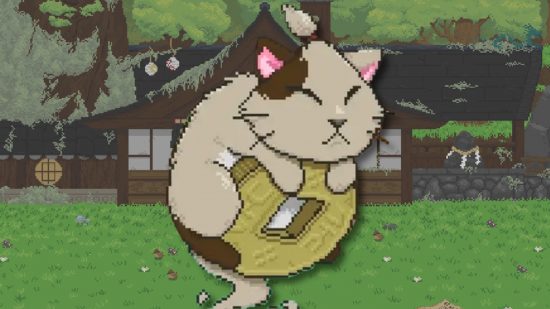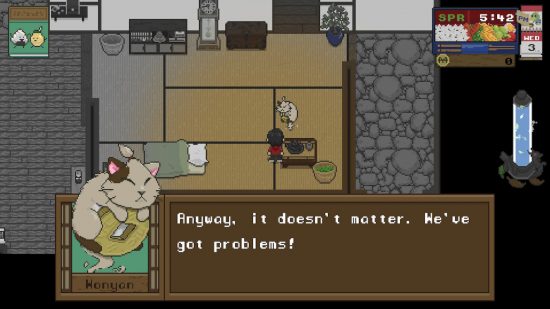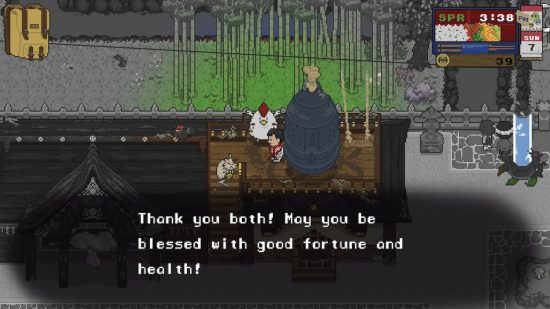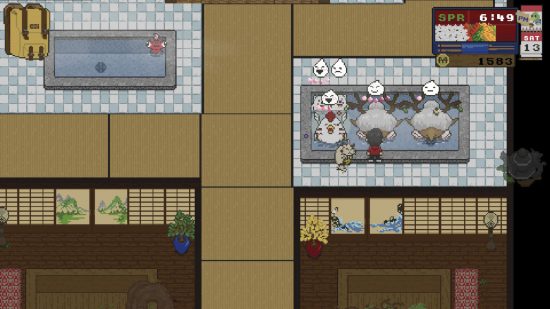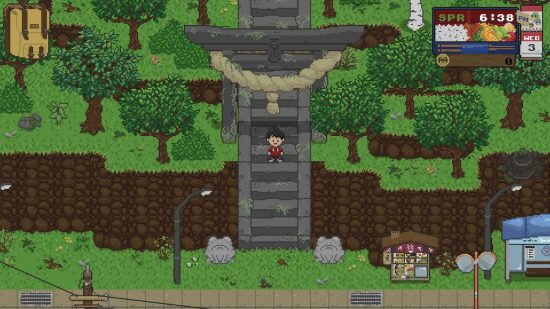Our Verdict
Spirittea is a truly enchanting blend of life sim, management sim, and RPG, with a vibe reminiscent of Spirited Away and Stardew Valley combined. With its charming world, engaging gameplay loop, and celebration of East Asian culture, it’s hard not to fall in love with this slice of rural heaven, flaws and all.
If there ever was a winning combo when it comes to coziness and overall good vibes, it’d be Stardew Valley and Studio Ghibli. And, while many have tried to emulate this concoction (even Stardew itself has some Ghibli-esque elements), no one has quite found the recipe for that perfect brew – that is, until Spirittea.
This wonderfully heart-warming, cozy RPG-slash-life sim from developer Cheesemaster Games and publisher No More Robots was easily one of my most highly anticipated games of the year, and I’m sure I’m not alone – especially considering that the Haunted Chocolatier release date and Witchbrook release date seem so far away. This is why I’m very pleased to sit down today to share this very positive Spirittea review with you. So sit down, grab a cup of your favorite blend, and prepare to be transported to an entirely enchanting world.
Spirittea sees you take the role of a fantasy author who moves to an old house in a remote, rural town in hopes of getting some inspiration for your next book. However, you certainly get more than you bargained for. This quaint little town is full of friendly faces (and some not-so-friendly, at least at first) who quickly make you feel at home in your new place, but it’s also not long before you realize that there are some spooky occurrences going on.
After seeing a hovering rice ball eaten by an invisible entity, you know these otherworldly events aren’t simply small-town gossip. This is reinforced when you brew up some fresh tea leaves in the mysterious old teapot in your house and suddenly gain the ability to see ghosts – which is how you first meet Wonyan, a spiritual guide (and apparently, a rice ball thief), in the form of a ghostly cat floating around on a coin.
From here, you learn all about the spiritual history of the town and how the spirits became lost after people stopped leaving offerings for them. Now, these lost spirits are causing trouble for your more lively neighbors, so it’s up to you to help them out, both for the sake of the townsfolk and for the sake of the spirits themselves.
The gameplay is split into a few different parts. Firstly, there’s the life sim element, where you can freely explore the town. The game features a day/night system, and all the characters have their own daily schedules. All the shops and restaurants open and close at specific times on specific days, too, and Song’s store has a rotating list of stock that switches up every day. On top of that, there are four seasons that determine the weather, fish, etc. As with other games in the life sim genre, these systems add a real sense of life and community to the game, as you see the NPCs interacting with each other and living their normal lives around you.
While small, your new home is also packed with things to do, including chatting with and befriending the townsfolk, shopping, fishing, bug catching, digging for treasure (and spirit tomes), cooking, karaoke, and more. Some of these activities involve minigames, such as putting together a lettuce wrap at Julian’s barbeque restaurant or getting groovy with a cute, animal-themed rhythm game at karaoke.
Fishing is tied to a minigame as well, where you must follow a fish around a dial while constantly hitting the ‘reel’ button. These offer a really fun change of pace and something to do in your downtime – and, if you don’t fancy doing them on your own, you can invite the townsfolk to join you to increase their friendship level.
The next facet of Spirittea’s gameplay revolves around helping those townsfolk with the spirit-related issues they face. Whether it’s weird plants growing around a bath or the case of the disappearing carrots, you can guarantee most issues the townsfolk face are spirit-related, so it’s up to you to listen to and decode clues, locate the spirit and give them what they need in order to return to their usual selves.
Finally, there’s the bathhouse. The bathhouse is a place where all the spirits you’ve met invite their friends to come and relax. Your main responsibility is to keep the spirits happy by ensuring that the water is at the right temperature, that there are enough towels for all guests, and that they have a great bathing experience. Spirits then leave you cash after they finish their bath, and you can use that to renovate and expand different areas of the bathhouse, purchase new items from the shops, and more.
One of the trickiest parts here is working out the spirits’ likes and dislikes. Each spirit is associated with a season, and they hate sitting next to spirits tied to seasons opposite their own. For example, a summer spirit is happy to rub shoulders with a spring spirit, a fall spirit, or another summer spirit, but hates bathing next to a winter spirit.
Unfortunately, it’s pretty impossible to work out what season a spirit is associated with unless you find its spirit tome buried around the town, which can be tough to track down – so it’s generally a lot of trial and error at first. Luckily, you can still appease a spirit by scrubbing its back with a broom or giving it its favorite food.
Gameplay in the bathhouse feels like a laid-back business simulation game. You don’t get much rest when you’re working a shift there – at least, not until you get some extra help further down the line – but it doesn’t feel too pressured, as the only real negative outcome of performing poorly is that you won’t get as much money at the end of the night. It’s the right balance between engaging and chill, and, while it may get repetitive for some people, I see it as no more repetitive than the core gameplay loop in Stardew Valley – especially as you can start work at the bathhouse whenever you fancy, and leave as soon as you want.
Of course, there’s more to the game than just this, too – there’s a locked area for you to work towards, heaps of treasures, bugs, fish, and recipes for you to collect, shrines to give offerings to, and even romance. Overall, I’ve spent around 18 hours in the Switch version (completed 23%) and around nine hours in the PC version (completed 14%) and, while I’ve definitely been taking my time, I know there’s still so much to see – which is very exciting, considering that I’ve loved everything I’ve seen so far.
All that being said, I do have a few minor issues with Spirittea. Firstly, I find that certain elements can be quite obtuse – there’s no button prompt, and sometimes it can be hard to differentiate between decorative and interactable items. Additionally, a few of the spirit-related quests have some pretty obscure solutions, and, while I very much enjoy the lack of hand-holding, I feel some players may prefer some more useful hints (especially as Wonyan’s very rare ‘hints’ do little other than remind you of pretty obvious details).
There are also some issues with the map not updating or claiming that NPCs are in completely the wrong location, and some bugs with NPC pathing, sometimes rendering them unresponsive as they creepily stare at a wall for hours unless you go to sleep or quit to the main menu and reload your save. This is a fairly common issue in newly released games, so I’m hoping we’ll get a patch to work out these kinks in the future.
Finally, I really feel like Spirittea would benefit greatly from some form of toolbar. It can be quite tedious having to open your backpack to get out or switch to a different tool, and it’s frustrating that you can’t pick up an item while holding one. This is especially noticeable when you’re digging – in order to grab an item you’ve just dug up, you need to either drop or put away your shovel, pick up the item and press a button to put it in your backpack, then either pick up or get your shovel out of your backpack again before you can carry on. I understand not wanting a chunky toolbar taking up the screen in such a pretty game, but even assigning one button to toggle between the items in your backpack would suffice.

Right, enough griping, onto performance. Spirittea, for the most part, performs beautifully on the Switch. Controls are simple and responsive, load screens between areas are very quick, and everything looks extremely vibrant. Beyond those NPC pathing issues, I have experienced a little stuttering here and there while walking about in a storm, but it usually fixes itself quite quickly. I have also had a bug where my character got stuck during a cutscene so I had to reload, but that very much seemed to be a one-off because of where I was positioned at the time.
The PC version is quite closely comparable to the Switch version in this case, only minus the stuttering. However, I will say that it’s clear Spirittea was designed with a controller in mind, so playing with a keyboard and mouse can be a bit of a chore – especially with the fishing minigame.
Spirittea’s visuals are an absolute delight, capturing beautiful elements of East Asian culture and rendering them in gorgeous, vibrant colors. It’s clear that there’s a lot of love and passion poured into every aspect of the design, and I really appreciate it. Even the menus and maps are perfectly on theme, and the occasional fourth-wall-breaking interferences with the dialogue boxes are a real joy. On top of that, the spirit designs are impeccable, and seeing them first appear in that ‘who’s that Pokémon?’-esque reveal is always exciting.
Everything also translates well across different screen sizes, whether you’re playing the Switch in handheld, docked with a large TV, or docked with a computer monitor, everything is well-sized, consistent, and clear. And, to top it all off, the audio is lovely – combining calming ambiance from birds, cicadas, the ocean, and the wind through the trees, with whimsical flutes and piano to create a very Ghibli-esque soundtrack. I do wish the music was a little more consistent, as it often cuts out, but in some ways, I do prefer that to a constant loop, so I can’t really complain!
For its low price, Spirittea is an absolute steal. Throughout my cumulative 27 hours in the game so far, I’ve already gotten more than enough joy to warrant its price tag, and I’m still only a fraction of the way through the content. On top of that, even though the PC version is available on Game Pass, if a passionate playerbase forms and starts bringing Spirittea content to Nexus Mods, I will absolutely buy it on Steam, too. Just imagine the potential – I’d love to see some community-made spirits, characters, quests, and decorations to add even more replayability to this already detail-rich game.
Overall, I positively adore Spirittea. In fact, within my first hour of gameplay, I was already convinced that it is GOTY material, and my love for it has only grown from there – to the point where I’d say it easily rivals Stardew Valley in my heart. While it does have a few faults here and there, the overall package is truly enchanting, and I’m so excited to continue my adventures with Wonyan, the spirits, and all my lovely virtual neighbors. If you love Spirited Away and you love games like Stardew Valley, I implore you to at least give the demo a try – I’m sure you won’t be disappointed.
Right, I’m off to go brew a supernatural cup of tea and try to convince my team that Spirittea deserves to be on our list of the best Switch games. In the meantime, if you fancy even more chill experiences, take a look at our top picks for the best farm games. Or, if you’re all about those spirits, head on over to our lists of the best ghost games or the best horror games.
